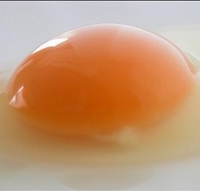 There’s more good news for the “incredible, edible egg." Peptides found in egg whites have been found to reduce blood pressure about as much as a low dose of a common high blood pressure medication, according to new research presented at the 245th National Meeting & Exposition of the American Chemical Society (ACS).
There’s more good news for the “incredible, edible egg." Peptides found in egg whites have been found to reduce blood pressure about as much as a low dose of a common high blood pressure medication, according to new research presented at the 245th National Meeting & Exposition of the American Chemical Society (ACS).Scientists previously discovered the peptide called RVPSL, like the family of medications that includes Captopril, Vasotec and Monopril, was an angiotensin-converting-enzyme (ACE) inhibitor. It has a powerful ability to inhibit or block the action of ACE, a substance produced in the body that raises blood pressure.
Researchers at Jilin University in China and colleagues at Clemson University set out to further document RVPSL’s effects, using laboratory rats that develop high blood pressure and are stand-ins for humans in such early research on hypertension. The results of feeding the substance were positive, showing that RVPSL did not have apparent toxic effects and lowered blood pressure by amounts comparable to low doses of Captopril.
“Our results support and enhance previous findings on this topic," said study leader Zhipeng Yu, Ph.D., Jilin University. “They were promising enough to move ahead with further research on the effects of the egg white peptide on human health."
Yu said the research was done with a version of the peptide that was heated to almost 200 degrees Fahrenheit during preparation—less than the temperatures typically used to cook eggs. He cited evidence from other research, however, that egg whites may retain their beneficial effects on blood pressure after cooking.
He said egg white peptides, either in eggs or as a supplement, could become useful as an adjunct to high-blood-pressure medication.





